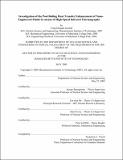Investigation of the pool boiling heat transfer enhancement of nano-engineered fluids by means of high-speed infrared thermography
Author(s)
Gerardi, Craig Douglas
DownloadFull printable version (10.35Mb)
Other Contributors
Massachusetts Institute of Technology. Dept. of Nuclear Science and Engineering.
Advisor
Jacopo Buongiorno, Lin-wen Hu and David Cory.
Terms of use
Metadata
Show full item recordAbstract
A high-speed video and infrared thermography based technique has been used to obtain detailed and fundamental time- and space-resolved information on pool boiling heat transfer. The work is enabled by recent advances in heat transfer diagnostics and motivated by increased interest in the enhancement of heat transfer for applications such as micro-electronics, space heat-transfer systems, and advanced nuclear reactors. This study critically examined the fundamental processes occurring during nucleate boiling, critical heat flux, and rewetting on thin-film heating elements. A significant focus of the work was to investigate and explain the modification of these heat transfer phenomena through the addition of silica and diamond nanoparticles to the working fluid. Bubble departure diameter and frequency, growth and wait times, and nucleation site density were measured for every nucleation site during nucleate pool boiling at multiple superheats. The data were compared with decades-old and poorly-validated models and correlations, and were used to evaluate the relative contribution of the superheated liquid layer and microlayer evaporation to bubble growth. Deterioration in nucleate boiling heat transfer of water-based nanofluids was observed. It was determined that a reduction in the static contact angle, caused by nanoparticle deposition on the surface during boiling, created a larger energy barrier for nucleation, which in turn reduced bubble departure frequency and nucleation density, thus resulting in a reduced heat transfer coefficient. (cont.) Critical heat flux enhancement in nanofluids of up to 100% was experimentally observed. The cause of this enhancement was determined to be the decreased static contact angle of nanofluid boiled surfaces. The increased wettability modified the growth of bubbles prior to CHF and promoted rewetting of hotspots at CHF. In parallel quenching tests, rewetting temperatures and velocities were simultaneously measured for the first time. Surfaces that had been pre-boiled in nanofluids were found to have significantly higher rewetting temperatures and velocities than clean surfaces. Interpretation of the experimental data was conducted with consideration of the governing surface parameters and existing models. It was found that there is significant room for improvement of most pool boiling models, especially with regard to surface effects. The research performed in this thesis help demonstrate the power of the infrared thermography technique and its potential for future improvement of boiling models.
Description
Thesis (Ph. D.)--Massachusetts Institute of Technology, Dept. of Nuclear Science and Engineering, 2009. This electronic version was submitted by the student author. The certified thesis is available in the Institute Archives and Special Collections. Cataloged from student-submitted PDF version of thesis. Includes bibliographical references (p. 445-466).
Date issued
2009Department
Massachusetts Institute of Technology. Department of Nuclear Science and EngineeringPublisher
Massachusetts Institute of Technology
Keywords
Nuclear Science and Engineering.